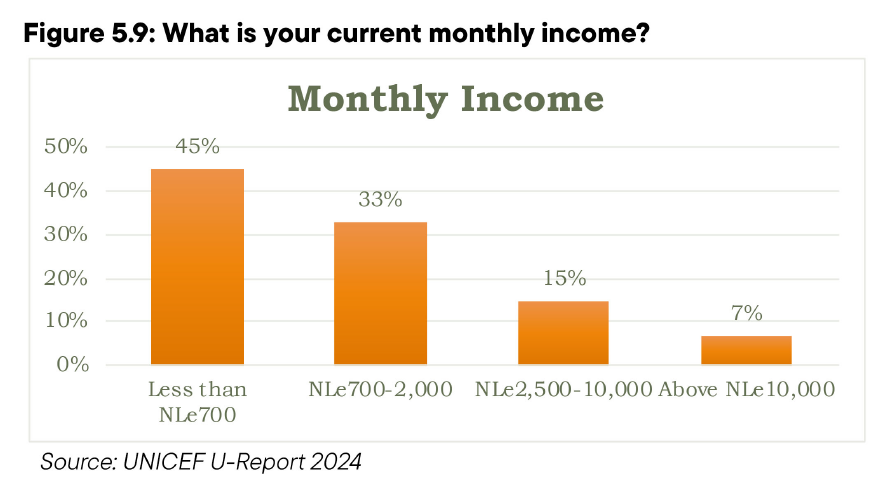Freetown, September 8th 2025– A staggering 45% of young Sierra Leoneans earn less than NLe700 per month, according to new findings from the UNICEF U-Report 2024. The data, drawn from a nationwide youth survey, paints a sobering picture of economic stagnation and deepening poverty among the country’s most vital demographic.
The report categorizes monthly income into four brackets, revealing that:
- 45% earn less than NLe700
- 33% fall between NLe700–2,000
- 15% earn NLe2,500–10,000
- Only 7% report incomes above NLe10,000
These figures underscore a troubling reality: nearly 80% of respondents subsist on less than NLe2,000 monthly, barely enough to cover basic food, transport, and communication costs. For many, the dream of upward mobility remains elusive.
“This isn’t just about low wages, it’s about institutional neglect,” says Mariama Conteh, a youth advocate in Bo. “We’re graduating into an economy that doesn’t see us, doesn’t pay us, and doesn’t plan for us.”
The implications ripple far beyond individual hardship. With youth comprising over 60% of Sierra Leone’s population, such income disparities threaten national productivity, deepen dependency, and fuel migration pressures. Many young people, disillusioned by domestic prospects, are turning to irregular migration routes or informal economies often at great personal risk.
Despite government pledges to boost youth employment, critics argue that current interventions lack scale, coordination, and transparency. Payroll opacity, limited access to credit, and underfunded vocational programs continue to stifle progress.
Economic analyst Abdulai Kamara notes, “We need more than slogans. We need a youth wage floor, public-private job schemes, and real-time income tracking. Otherwise, we’re just recycling poverty.”
The UNICEF data arrives at a critical juncture, as Sierra Leone prepares its next national development strategy. Advocacy groups are urging policymakers to:
- Establish a minimum youth wage benchmark
- Expand digital job platforms and freelance training
- Introduce income transparency laws across public institutions
- Fund community-based entrepreneurship hubs
Without bold reforms, the country risks losing its most dynamic generation to economic despair and external migration.









